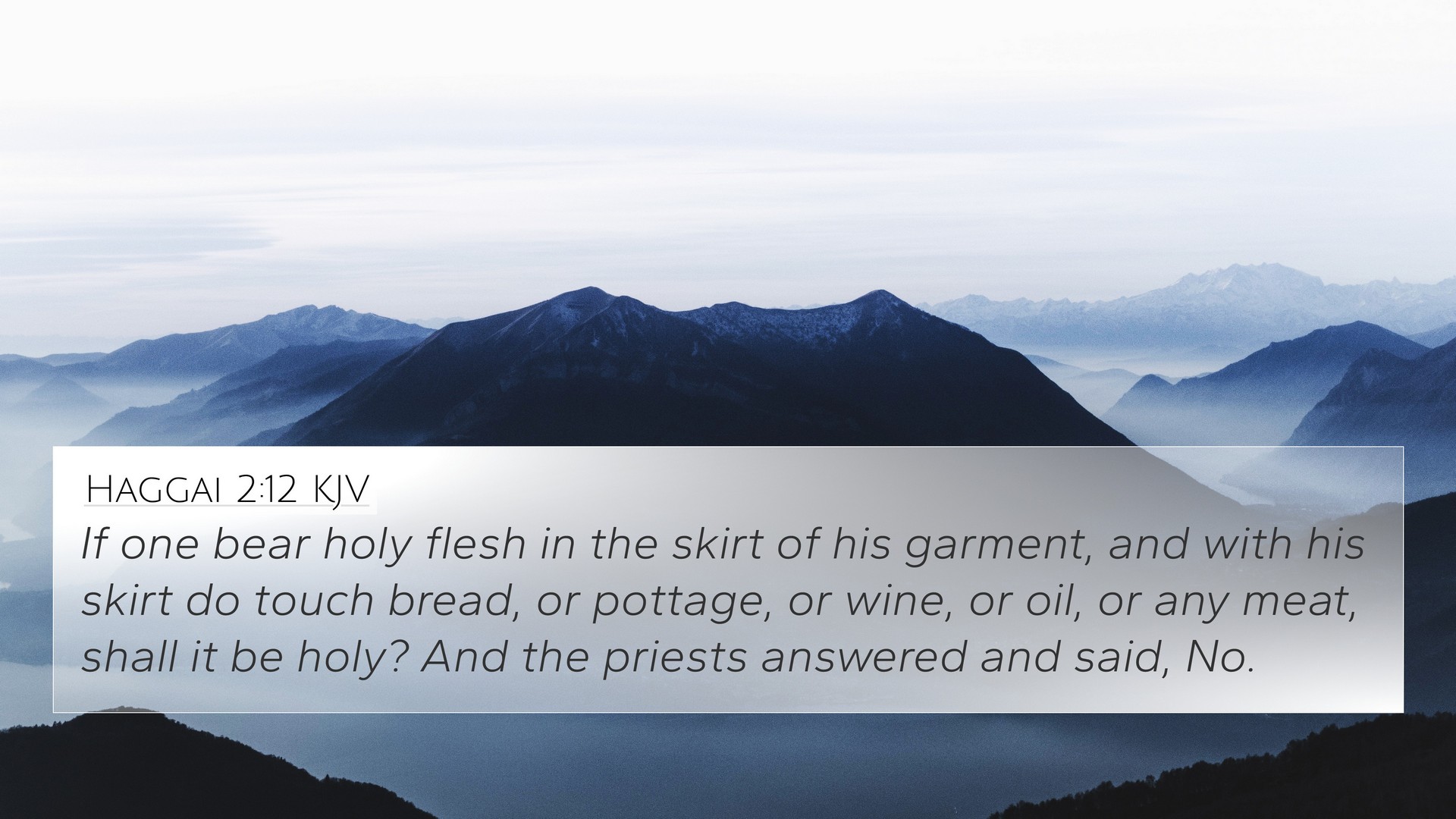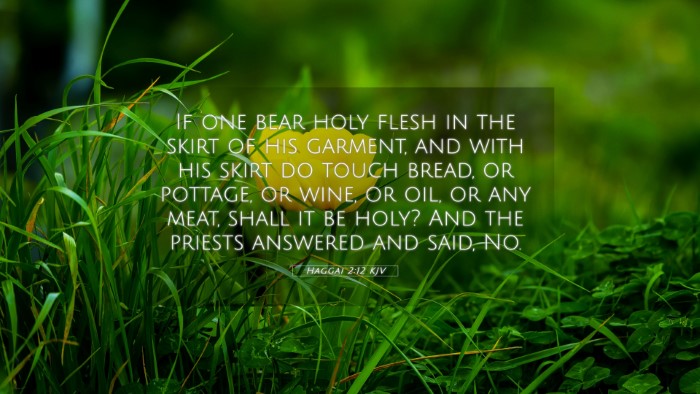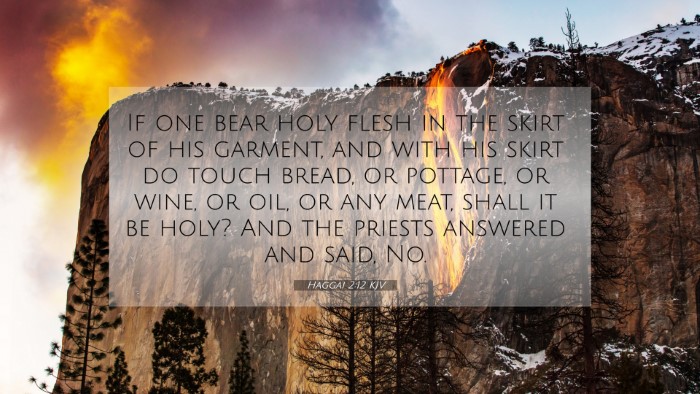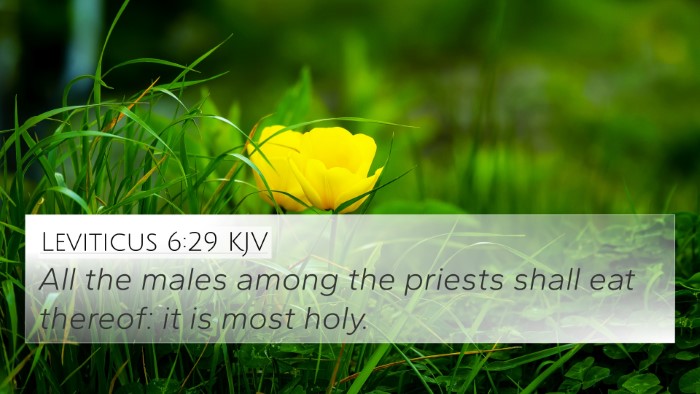Old Testament
Genesis Exodus Leviticus Numbers Deuteronomy Joshua Judges Ruth 1 Samuel 2 Samuel 1 Kings 2 Kings 1 Chronicles 2 Chronicles Ezra Nehemiah Esther Job Psalms Proverbs Ecclesiastes Song of Solomon Isaiah Jeremiah Lamentations Ezekiel Daniel Hosea Joel Amos Obadiah Jonah Micah Nahum Habakkuk Zephaniah Haggai Zechariah MalachiHaggai 2:12 Similar Verses
Haggai 2:12 Cross References
If one bear holy flesh in the skirt of his garment, and with his skirt do touch bread, or pottage, or wine, or oil, or any meat, shall it be holy? And the priests answered and said, No.
Uncover the Rich Themes and Topics of This Bible Verse
Listed below are the Bible themes associated with Haggai 2:12. We invite you to explore each theme to gain deeper insights into the Scriptures.
Haggai 2:12 Cross Reference Verses
This section features a detailed cross-reference designed to enrich your understanding of the Scriptures. Below, you will find carefully selected verses that echo the themes and teachings related to Haggai 2:12 KJV. Click on any image to explore detailed analyses of related Bible verses and uncover deeper theological insights.

Matthew 23:19 (KJV) »
Ye fools and blind: for whether is greater, the gift, or the altar that sanctifieth the gift?
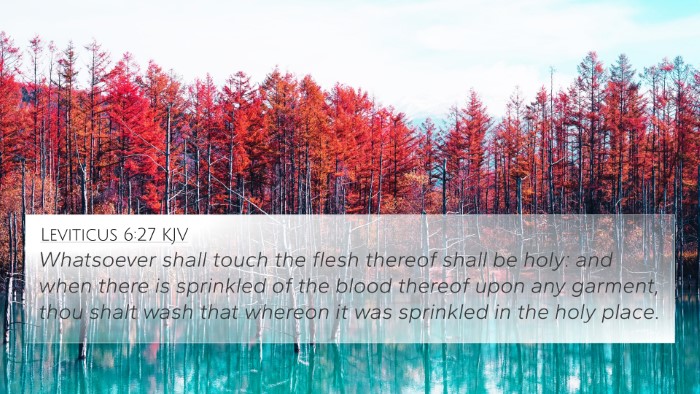
Leviticus 6:27 (KJV) »
Whatsoever shall touch the flesh thereof shall be holy: and when there is sprinkled of the blood thereof upon any garment, thou shalt wash that whereon it was sprinkled in the holy place.
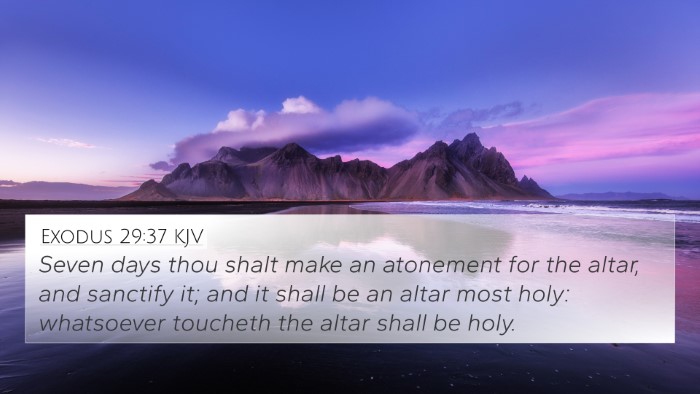
Exodus 29:37 (KJV) »
Seven days thou shalt make an atonement for the altar, and sanctify it; and it shall be an altar most holy: whatsoever toucheth the altar shall be holy.
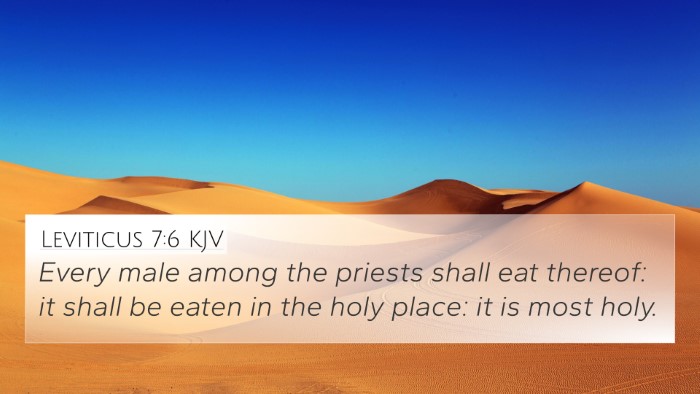
Leviticus 7:6 (KJV) »
Every male among the priests shall eat thereof: it shall be eaten in the holy place: it is most holy.

Ezekiel 44:19 (KJV) »
And when they go forth into the utter court, even into the utter court to the people, they shall put off their garments wherein they ministered, and lay them in the holy chambers, and they shall put on other garments; and they shall not sanctify the people with their garments.
Haggai 2:12 Verse Analysis and Similar Verses
Understanding Haggai 2:12
Haggai 2:12 reads: "If one carries holy meat in the fold of his garment, and with his fold touches bread or pottage, or wine, or oil, or any meat, shall it be holy?"
This verse reflects on the concept of holiness and its implications. To grasp the meaning of this verse, we can draw insights from several public domain commentaries, such as those from Matthew Henry, Albert Barnes, and Adam Clarke.
Verse Analysis
-
Contextual Background:
Haggai was speaking to the Israelites who had returned from exile and were concerned about the rebuilding of the temple. This verse is part of a discourse on the nature of holiness and how it is transmitted (or not transmitted) in daily life.
-
Matthew Henry's Commentary:
Matthew Henry emphasizes that holiness cannot be transferred through mere contact. Just as the sanctity of the offerings does not make mundane items holy, individual believers cannot impart their holiness to others merely by being associated with them.
-
Albert Barnes' Commentary:
Barnes discusses the significance of holiness and how this verse illustrates that it is not enough to simply be in proximity to holy things to be considered holy oneself. Spiritual purity cannot be contagiously passed on but requires personal commitment and dedication to God's laws.
-
Adam Clarke's Commentary:
Clarke notes that this verse serves as a powerful illustration of the principle that corrupt practices cannot be sanctified by association with the holy. His analysis underscores the importance of individual integrity and the necessity of genuine faith and lifestyle in a believer's life.
Thematic Connections
The verse prompts an exploration of the connections between Bible verses dealing with holiness and purity. Several scriptures emphasize similar themes:
- Leviticus 10:10: Discusses distinguishing between the holy and unholy, highlighting the call to maintain holiness.
- 1 Peter 1:16: Reiterates the call to be holy, for God is holy, focusing on the responsibility of individuals to aspire to holiness.
- Isaiah 6:5: Illustrates the realization of one's unholiness in the presence of God's holiness, prompting repentance and purification.
- Hebrews 12:14: Calls believers to pursue peace with everyone and holiness without which no one will see the Lord.
- James 1:27: Defines pure religion as visiting orphans and widows in their affliction and keeping oneself unspotted from the world.
- Matthew 23:25-26: Jesus speaks about cleansing the outside of the cup, indicating the importance of inner purity over external appearances.
- 2 Corinthians 7:1: Paul encourages believers to cleanse themselves from all filthiness of flesh and spirit to perfect holiness in the fear of God.
Cross-Referencing Insights
Analyzing Haggai 2:12 alongside related verses helps to draw deeper connections and understanding of holiness in the scripture. Below are tools and methods for effective Bible cross-referencing:
- Bible Concordance: Use a concordance to find verses that contain keywords like "holy" and "purity” to see how they relate across different books.
- Cross-Reference Bible Study: Engage in studies that connect various scriptures through themes of holiness and moral integrity.
- Identifying Connections: Look for parallel themes and teachings between the Old and New Testaments, like those about purity and spiritual integrity.
- Chain References: Follow chain references in your Bible tool to explore interconnected verses, enhancing thematic studies.
Conclusion
In conclusion, Haggai 2:12 serves as a pivotal reminder of the nature of holiness in the lives of believers. The teachings from various commentaries illuminate the importance of personal holiness and the nuances of spiritual integrity. Cross-referencing with interconnected scriptures allows for a deeper understanding of God's expectations for His people across both the Old and New Testaments.
